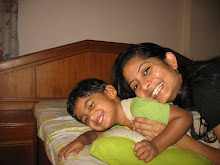thank you, god.
thank you for the sustenance
and of course, the diamonds
thank you my undying faith
that the bedbugs will have their wake
for the boy angel who sleeps at night
and the brat he turns into at light
thank you for the cozy apartment
and for someone to pay the rent
thank you for keeping the love alive
and knowing that it’ll never die
thank you for the brief separations
and superfast broadband connections
thank you for my strong mother
without her, you’d still be a stranger
for the million friends and family
who’ve always, always forgiven me
thank you for the free books
and the koftas my maid cooks
for the impromptu kisses and hugs
that make up for fat pay cheques
but most of all i thank thee
for never ever giving up on me.

